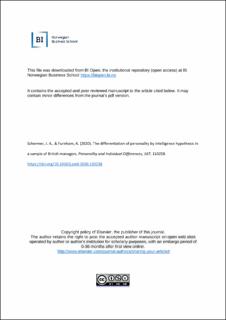The differentiation of personality by intelligence hypothesis in a sample of British managers
Journal article, Peer reviewed
Accepted version
Permanent lenke
https://hdl.handle.net/11250/2830249Utgivelsesdato
2020Metadata
Vis full innførselSamlinger
- Scientific articles [2181]
Sammendrag
In this study, we test the hypothesis that personality is more differentiated (variable) in individuals scoring higher in intelligence in a large sample (N = 16,258) of managers. In addition to a measure of intelligence and the Big Five personality factors, participants completed 11 “dark” personality scales in self-report format. The intelligence scores had a normal distribution. Following a tertile split for the intelligence scores, the higher and lower tertile group's standard deviations were compared. The higher ability tertile had significantly greater scale variances for most of the Big Five scales (with the exception of agreeableness) but the differences tended to be small. Only three of the “dark” personality scales had significantly larger standard deviations in the higher tertile group, but also these differences were small. The inter-scale correlations and exploratory factor analyses suggested less covariance among the upper intelligence group but not for single Big Five factor facets. These results demonstrate some, but not definitive, support for the differentiation of personality by intelligence hypothesis and expand on the test of the theory by suggesting that some of the darker personality scale responses may also differ depending on individual differences in intelligence.

